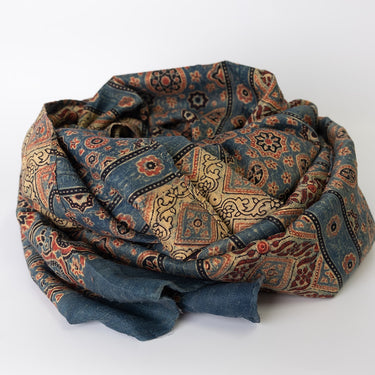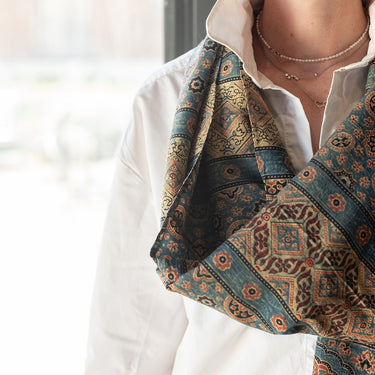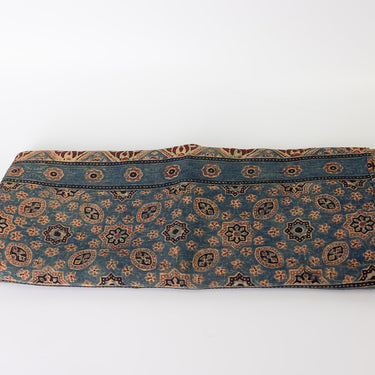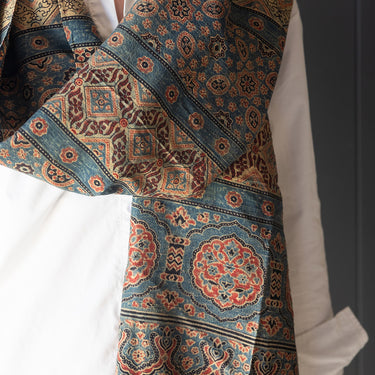Product Description
This is a one-off piece. Pion stole beparo - special edition of highly skilled, Ajrakh printing. Double side printed, this organic raw silk cotton blend stole is evidence of a highly, highly skilled artisan at the peak of his creative skills, with delicate & intricate patterns printed onto fabric using multiple intricately carved teak blocks.
- 100% natural products from fabric of raw silk and organic cotton blend to the 100% natural dyes
- hand block printed on both sides in delicate and intricate patterns
- dimensions: approx. 720mm wide x 2200mmlong
Some information about the artisan.
Dr. Ismail Khatri is an artisan expert in Ajrakh from Kutch, Gujarat.
He is a famous master craftsman of traditional ajrakh block printing that can be traced back to more than nine generations in his family. Being an archaeologist, Dr. Ismail Mohmed Khatri discovered the oldest art form in South Asia. He was awarded an honorary doctorate from De Montfort University, Leicester, the UK in 2003 for his deep knowledge of his tradition and craft processes. He has also won the UNESCO Award Seal of Excellence for handicrafts. Dr. Ismail Khatri has shared his vast experience and knowledge about Ajrakh block printing. Ajrakh is a subtle block printing artwork that came into existence back in the civilization of Indus Valley around 2500 BC- 1500 BC. His finely designed ajrakh block print products include sarees, dupattas, stoles, dress materials, and fabrics.
Ajrakh pion stole beparo (special edition)
This is a one-off piece. Pion stole beparo - special edition of highly skilled, Ajrakh printing. Double side printed, this organic raw silk cotton blend stole is evidence of a highly, highly skilled artisan at the peak of his creative skills, with delicate & intricate patterns printed onto fabric using multiple intricately carved teak blocks.
- 100% natural products from fabric of raw silk and organic cotton blend to the 100% natural dyes
- hand block printed on both sides in delicate and intricate patterns
- dimensions: approx. 720mm wide x 2200mmlong
Some information about the artisan.
Dr. Ismail Khatri is an artisan expert in Ajrakh from Kutch, Gujarat.
He is a famous master craftsman of traditional ajrakh block printing that can be traced back to more than nine generations in his family. Being an archaeologist, Dr. Ismail Mohmed Khatri discovered the oldest art form in South Asia. He was awarded an honorary doctorate from De Montfort University, Leicester, the UK in 2003 for his deep knowledge of his tradition and craft processes. He has also won the UNESCO Award Seal of Excellence for handicrafts. Dr. Ismail Khatri has shared his vast experience and knowledge about Ajrakh block printing. Ajrakh is a subtle block printing artwork that came into existence back in the civilization of Indus Valley around 2500 BC- 1500 BC. His finely designed ajrakh block print products include sarees, dupattas, stoles, dress materials, and fabrics.
Delivery
We ship Australia wide and use Australia Post Parcel, unless Express Post shipping has been selected. Please allow 2–3 working days for delivery to metropolitan areas for orders placed within business hours. For regional locations, WA and sale orders, please allow up to 3–10 working days.
If you have selected Express Post shipping, assuming your address lies within the Express Post network and you have purchased within business hours (see below), Express Post orders will arrive in 1–2 business days.
If you are interested in a piece of furniture please contact us for a quote for delivery on 0498 009 814 and allow up to three days for the quote. Or, you may choose to buy this piece and either collect it yourself or arrange your own delivery, in which case, jump right in and purchase it now.
We recommend shipping to your daytime address where applicable. Orders are dispatched on business days and during business hours, Monday– Friday, 10am–5pm AEST.
Merchant Campbell prioritises fast dispatch for online customers. Due to our regional location, delivery times listed above are an estimate only and we will not be liable for any delay in delivery. All orders placed on a Public Holiday will be dispatched the following business day.
Return
Any order purchased from Merchant Campbell can be returned or exchanged within 14 days. If you return an item within 14 days of receipt, we’ll give you back the amount you paid for the item or offer an exchange. Whichever you prefer.




